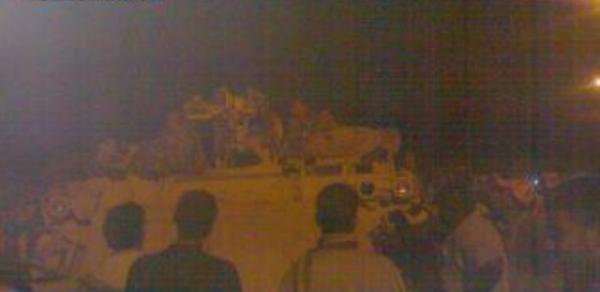Nov 15, 2011
The popular movement against a Canadian petrochemical plant has forced the Egyptian government to shut down the Agrium-Mopco gas-fertiliser factory, after residents shut down highways, bridges and a deepwater port, and battled the Egyptian military in the street.
Grainy photos and video-clips tweeted out – especially by Al-Jazeera’s @Mansourtalk – show locals standing up to military forces using live ammunition and tear gas. After 25 were arrested, fellow protestors besieged an army unit and APC until their friends were released. At least one local – Islam Abdullah – was killed by police or military and many others injured.

Twitter: Protestors besiege APC demanding release of their comrades @mansourtalk
Following the repression by the Egyptian state, the Damietta uprising has escalated its demands, calling for closure of other polluting factories in Damietta (including Methanex and SEGAS LNG – financed by RBS), and banning the construction of similar factories and complexes.

Repression threatens the uprising in Damietta @mansourtalk
The popular campaign against Agrium’s plant – using local gas to produce urea fertiliser – already scored a victory in 2008, forcing the Canadian company Agrium’s plans for a new petrochemical factory to merge with Egyptian Mopco. People in Damietta – and especially the Ras El-Barr island designated as the site – were worried about pollution destroying their health, the fish, the natural environment and potential for tourism. Fertiliser-producing plants are known to make local communities sick, with Agrium specifically facing controversy in several countries. Opposition to the new factory was strong across the town – including lawyers, fisherfolk, political activists, families and tourism developers. Black banners against the ‘factory of death’ were draped from homes and across streets: “Against Resource Drain and Pollution in Damietta…and No to Pollution in Ra’s al-Barr.”
Public unhappiness with the pollution from the existing factory and continuing construction grew since January, using the political space generated by the revolution. Newspaper Al-Masry Al-Youm quotes a statement from the protestors:
“They told us Agrium factory was moved out of Damietta. In 2011, after the revolution, we found out that we were deceived and that the factory wasn’t moved. The committee formed to mull the region’s environmental status proved that this factory had caused people many diseases and dangerously affected man, animal, plant and fish resources.”
The paper also quoted a local resident, Mohamed Hassouna, as saying
“We are choking from the toxic fumes coming out of the garbage dumped close to residential areas. The fumes are causing serious respiratory problems among the elderly and the ill.”
The uprising – in which the local community successfully shut down Damietta’s massive deepwater port and blockaded the highways and bridges for days – has touched a nerve in Egypt. There is already widespread unhappiness about the collusion between foreign multinationals, military-controlled companies and private Egyptian elite interests in using Egyptian resources (land, natural gas, etc) – frequently subsidised – to make outrageous profits. The role of the military in attacking the Damietta community physically enacts this co-operation against the people.
Pollution and dumping of waste in Egypt – such as in Idku by BG and BP – is increasingly being publicly challenged as a political decision, that prioritises profits for those in charge over the lives and rights over fenceline communities. The language of the revolution is being used to describe environmental injustice.
